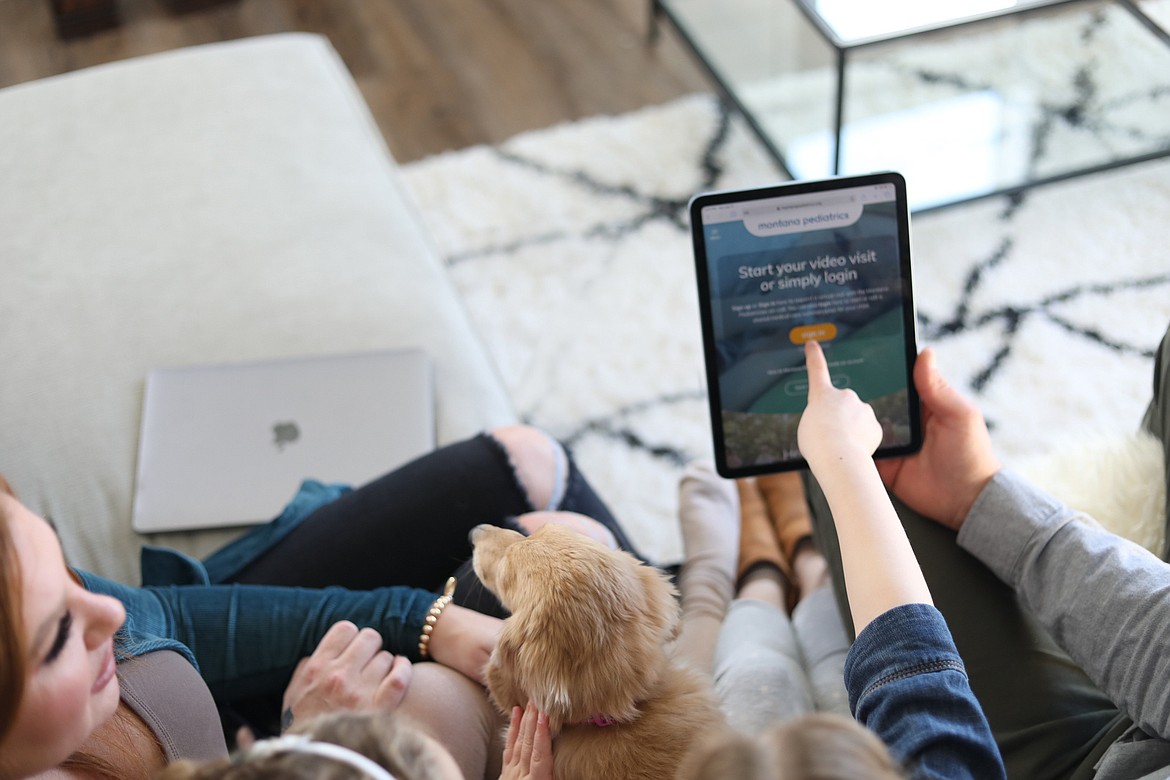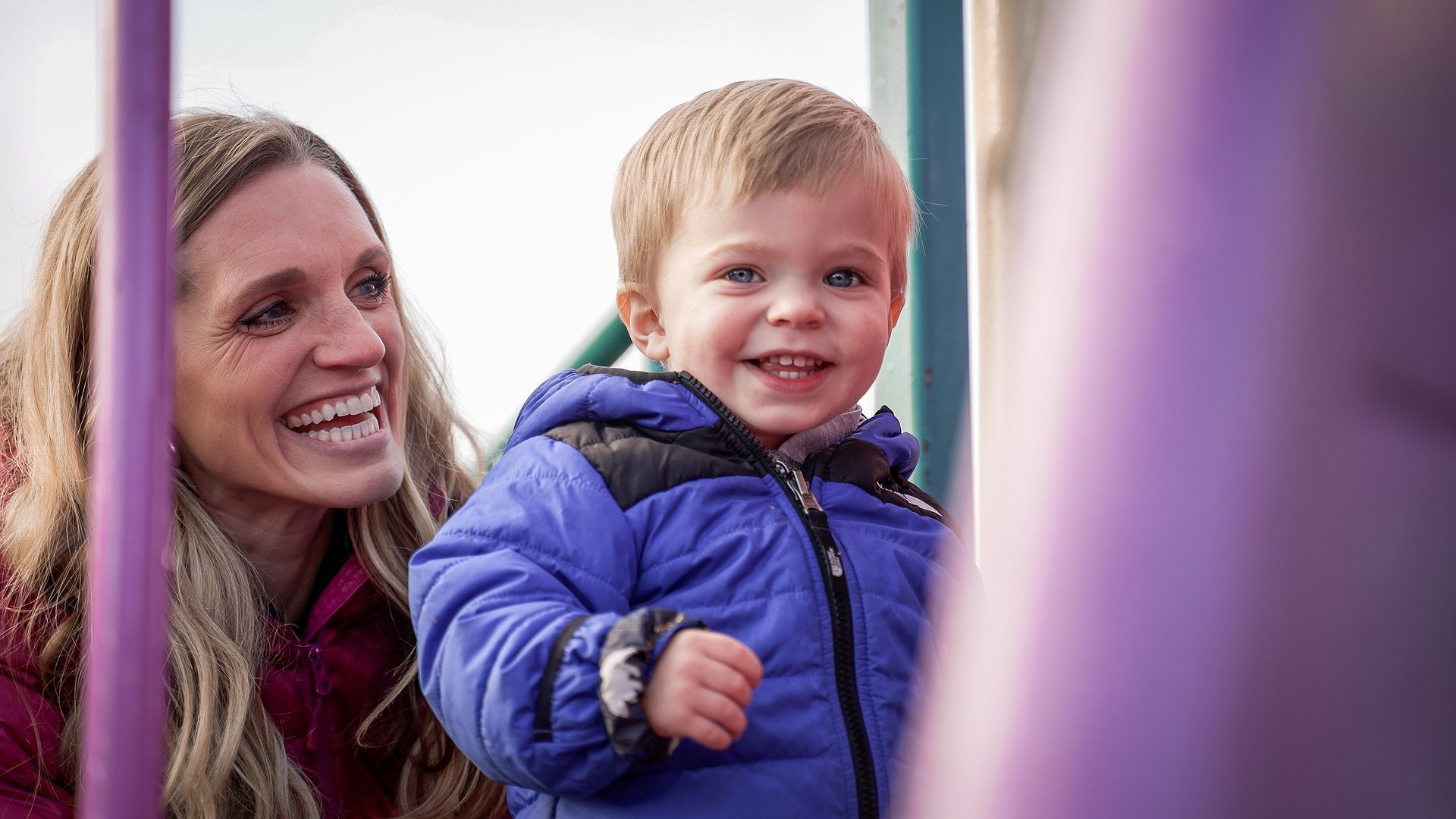Montana Pediatrics utilizes telehealth to close gaps in state’s health care system
Many Montana parents face a hard choice on cold, snowy nights when they are caring for a sick child. As the baby’s fever rises, snow continues to pile up in the driveway and time is ticking to decide whether or not to venture outside.
When parents aren’t sure if they need to drive to the emergency room, they can call Montana Pediatrics care line and be connected with a pediatrician via a telehealth call.
Sarah Rolfing has reached out to Montana Pediatrics twice for her young son. Both times she was connected to a provider within 15 minutes, precious time saved when dealing with a sick child who may need a trip to the ER.
“I was actually pretty anxious because my little guy was very much having a respiratory issue, which would have probably put us in the ER, had I not gotten a good consultation and a prescription right away,” Rolfing said.
Montana Pediatrics has partnered with around 40 providers in the state to participate in the After Hours Pediatric Care program. While the number of providers fluctuates, Chief Communications Officer Kate Lufkin said the organization has had around 60% of the state’s practicing pediatricians involved with the program at some point.
Rolfing got a nice surprise when she realized she was connected with her son’s pediatrician the most recent time she called in to use the After Hours program.
“I got on the phone and the person on the other end is his primary care doctor, which was cool, because I didn't have to explain anything,” Rolfing said. “Like a 15 minute house visit via telehealth, so it was great … And within an hour I was at the pharmacy getting the meds he needed.”
Rolfing receives the program as a work benefit through Logan Health, where she works as a nurse. But, Montana Pediatrics accepts all forms of insurance, cash pay and offers financial assistance for patients who need it.
The visit volumes have steadily climbed since October, reflecting an uptick the organization sees every year around wintertime. When temperatures plummet and snow starts to pile up, making the decision to drive to the ER can be daunting. Lufkin said this is one of the biggest benefits behind their after-hours program.
She said when the area got an arctic blast in recent weeks, they received a call from a worried family who called their primary care provider asking about their sick child. It was near closing time for their provider, who suggested they wait an hour until Montana Pediatrics opened and reach out to them via a video call.
“It was a great visit. I mean, we got to care for that kid at home, help reassure the parents and then keep them off of the wild and crazy roads,” Lufkin said.
Lufkin said Montana Pediatrics is not a primary care provider, but its emphasis on coordinated care means a quick follow-up with the patient’s health care provider the next morning.
“To me, that seems so common sense. But the unfortunate reality is health care in the U.S. is not structured that way and it doesn't do a good job of continuity of care and communication. So, that continuity piece is absolutely at the center of Montana Pediatrics,” Lufkin said.
In addition to the After Hours program, Montana Pediatrics has partnered with the Fort Peck Reservation to improve health. The organization also provides training resources about caring for students with diabetes, through their Diabetes in School Health program, a monthly health teleconference for school health personnel.
THERE ARE other initiatives on the horizon, Lufkin said in 2024, staff at Montana Pediatrics are thinking outside the box for ways to further help.
Behavioral health is one area the organization is beginning to explore. The pilot Integrated Behavioral Health program will pair providers with about 100 children, according to Lufkin.
The program was developed after spending several months working with a behavioral health consulting agency and speaking with providers to understand the industry landscape in the state.
“We recognize the challenge of mental and behavioral health for kids in Montana … We recognize where there's an incredible lack of providers. So we're partnering with two communities across the state on this pilot work, to just see how well this integrated behavioral health model functions,” Lufkin said.
Montana Pediatrics is hiring an integrated behavioral health program director to help steward the pilot.
“We're looking for a really good project manager, somebody who believes in the challenge of mental health in our state,” she said.
Also launching in 2024 is a pilot program providing at-home kits to families, which will include pulse oximeters, thermometers and a first aid kit, as well as Covid, strep, flu and RSV tests. This was made possible through a $1 million grant from the Dennis and Phyllis Washington Foundation.
Lufkin said the kits will be going to families located in counties with the greatest need, noting that 16 of Montana counties do not have a single health care provider and 36 counties do not have a practicing pediatrician. The 5,000 are planned to be sent out sometime in the first quarter of the year.
“We loved the idea of being able to give families the tools to use at home. But, we love even more having a network of Montana-based providers to support those Montana families. So we're kind of marrying both ideas together,” Lufkin said.
A portion of the boxes will likely include a digital otoscope, which looks at the inside of the ear. Because the tool is digital, it can capture photos of the inside of a child’s ear to be sent to a provider during a telehealth visit.
“We’re really excited about those. We haven't landed on the total number of boxes those will be included in, but typically, that's for kiddos between three and four-years-old,” Lufkin said.
Last year the organization launched a pilot program with funds provided by a grant from the Health Resources Services Administration to focus on complex coordinated care for families in Montana. The group partnered with the University of Montana to put together a program to help rural families who have a child with medical complexities navigate treatment.
"We see often that all of the care and coordination has to fall on the shoulders of one of the parents. And oftentimes, one of the parents ends up quitting their job to coordinate all of this — they're trying to talk with providers across so many different health systems, whether that's in state or out of state,” Lufkin said.
Montana Pediatrics put together a community advisory board over the last year composed of families who care for children with special health care needs. These board members shared their diagnosis and experience with what has worked for their care. Providers and patients have also already been identified for this pilot too, Lufkin said 100 children are enrolled.
“That's a five-year grant and we're just in year two, so we're at the very early stages of that. We were the only program chosen west of the Mississippi, I believe we're the only rural care program … And so it's really cool that Montana is represented in that work, because the rest of them are not rural focused,” Lufkin said.
It was also last year when the organization launched a pilot program where its services were offered as a work benefit. Partnering with two large companies in Montana, one of which was Logan Health, Lufkin said Montana Pediatrics staff were able to measure the impacts and saw promising results.
“Both on the workforce side, but also how much money it saved families by avoiding an emergency room or an urgent care visit,” Lufkin said. “So, one of our big goals for this year is to expand that to more employers across Montana.”
Rolfing is a big fan and recommends the program to all of her coworkers. She likened the service to the old days of when doctors made house calls.
“When you're a parent, and especially when you're working 12-hour shifts, and you're going to leave for work and your kid is having a respiratory disaster. It is so nice to be able to have the tools you need to get the care for those kids,” Rolfing said.
To find out more about Montana Pediatrics, visit montanapediatrics.org. A link to create an account can be found on the homepage.
Reporter Taylor Inman can be reached at 406-758-4433 or by emailing tinman@dailyinterlake.com.




